1. Bringing a Dish to Potlucks
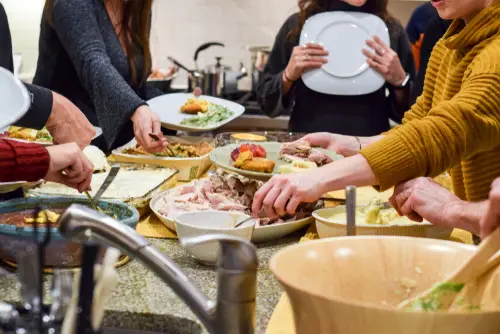
Potlucks are a staple of American gatherings, from church events to office parties. They’re built on the idea of everyone contributing something, but the rules are often unspoken. Bringing nothing can feel like you’re freeloading, even if the host says it’s fine. That’s why people still grab a bag of chips on the way, just to avoid being judged.
The awkwardness comes from showing up empty-handed, which feels like you’re breaking a social contract. A store-bought dish might not impress, but it checks the box. The tradition lingers because nobody wants to be the person who didn’t pitch in. It’s less about the food and more about signaling respect for the group.
2. Saying “Bless You” After a Sneeze

Most Americans still say “bless you” when someone sneezes, even though few stop to consider why. The phrase dates back to superstitions about sneezing being linked to illness or even the soul leaving the body. Today, most people use it as a polite reflex rather than a genuine wish of divine protection. Not saying it, though, often feels awkward, like you’re ignoring someone’s sneeze on purpose.
That’s the real reason the tradition sticks around—it’s easier to just say “bless you” than risk someone thinking you’re rude. Even if you don’t believe in the origins, the silence feels louder than the sneeze itself. Social expectations can be powerful glue for customs like this. It’s less about the words and more about keeping the interaction smooth.
3. Sending Thank-You Notes
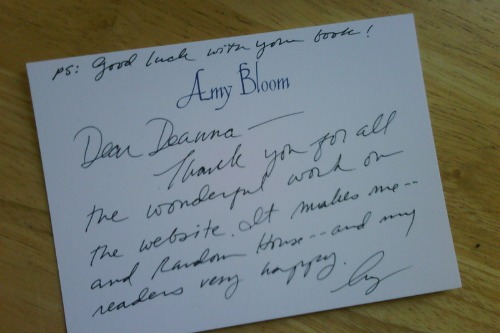
Handwritten thank-you notes are less common in the digital age, but they haven’t disappeared. People still send them after weddings, graduations, or big gifts. The reason is simple: skipping the note can make you seem ungrateful. Even a short message avoids the possibility of hurting feelings.
Many Americans see thank-you notes as old-fashioned, but they’re a safety net for manners. Emails or texts are faster, yet they don’t carry the same weight. The card feels more intentional, even if it’s just a formality. That layer of effort keeps the tradition alive.
4. Waving at Neighbors
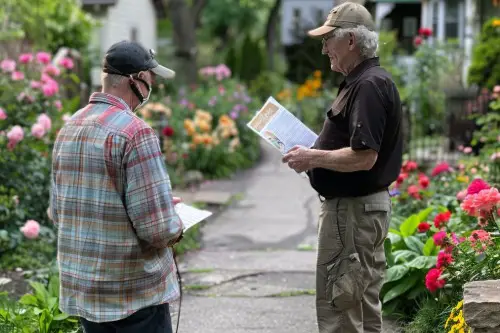
In many American suburbs, waving at neighbors is almost automatic. It’s a quick acknowledgment that says, “I see you, and I’m friendly.” Ignoring someone can feel cold or unfriendly, even if you’re just distracted. The wave helps maintain surface-level harmony without requiring a full chat.
People keep this habit alive because it prevents tension on the block. A neighbor who doesn’t wave might get labeled standoffish, even if they’re perfectly nice. The wave is small but carries weight in keeping the peace. It’s basically the cheapest form of neighborhood diplomacy.
5. Asking “How Are You?” Without Wanting an Answer

Americans famously ask “How are you?” as a greeting, not an actual question. Most people reply with “Good, how are you?” no matter how they really feel. Breaking that script can make things awkward fast, especially in casual settings. The ritual smooths interactions and avoids uncomfortable silences.
This tradition sticks because it sets a predictable rhythm in conversations. People know the drill and don’t have to think about how to respond. While it may feel shallow, it saves everyone from the risk of oversharing or misreading the moment. It’s politeness on autopilot.
6. Standing for the National Anthem

Standing during the national anthem is one of the most visible traditions in the U.S. While some see it as patriotic, many join in simply to avoid standing out. Staying seated often draws unwanted attention or judgment, regardless of personal beliefs. It’s easier to stand than explain yourself afterward.
The tradition persists because it functions as a social shortcut. Participation signals respect and avoids confrontation, whether or not someone feels strongly about it. In group settings like sports games, the pressure is amplified. Nobody wants to be the lone person sitting while thousands stand.
7. Bringing a Host Gift

When visiting someone’s home, Americans often bring wine, flowers, or dessert. It’s not always necessary, but skipping it can feel rude. The gesture shows appreciation, even if the host insists you don’t need to bring anything. People would rather show up with a token than risk seeming ungrateful.
The awkward part is that forgetting a host gift makes you stand out. Guests keep the tradition alive as a form of social insurance. Even a modest offering avoids potential embarrassment. It’s less about the item itself and more about signaling thoughtfulness.
8. Holding Doors Open
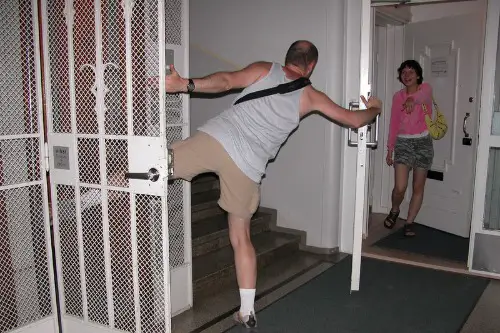
Holding doors open for others is ingrained in American etiquette. It’s a small act of politeness, but it carries outsized importance. Walking through without acknowledging the person behind you feels dismissive. Nobody wants to be labeled inconsiderate, so the habit persists.
This tradition sticks partly because the alternative is uncomfortable. If you let the door shut in someone’s face, even by accident, you risk a dirty look. People hold the door because it smooths over potential friction. It’s a quick, low-effort way to avoid an awkward moment.
9. Holiday Cards

Mailed holiday cards still fill American mailboxes, despite texts and emails being easier. Families send them as updates, often with posed photos. Skipping a card can feel like dropping out of the social loop. Even those who dread writing them keep at it to avoid appearing distant.
The real function of holiday cards is maintaining ties, even superficial ones. They reassure friends and relatives that they haven’t been forgotten. Without them, some relationships might quietly fade. The ritual survives because it prevents uncomfortable questions about disappearing connections.
10. Small Talk About the Weather
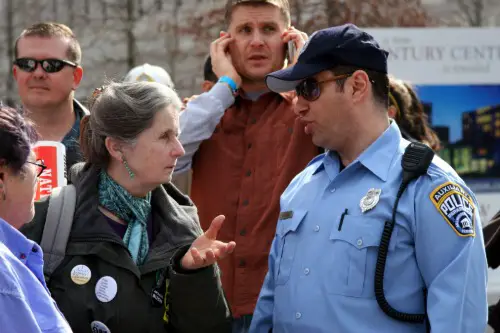
Talking about the weather is the ultimate American icebreaker. It’s safe, neutral, and always available. People rely on it when they don’t know what else to say. Avoiding it risks awkward pauses, especially with strangers.
The tradition works because it eases people into conversation without risk. No one’s going to be offended by a comment about rain or sunshine. It may be cliché, but it helps fill gaps when silence feels heavy. That usefulness keeps it alive in everyday encounters.
11. Singing “Happy Birthday”
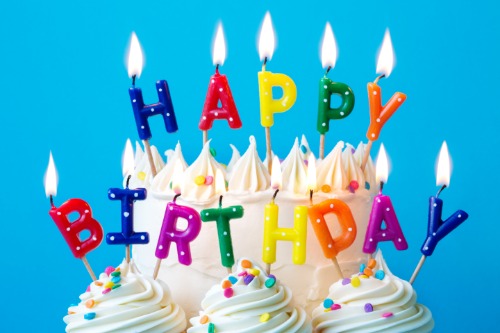
Almost everyone admits the “Happy Birthday” song is awkward. People don’t know what to do with their hands, and the singing is often off-key. Yet the tradition continues because skipping it would feel even stranger. Not singing makes the celebration seem incomplete.
This ritual sticks because it signals community more than musical talent. The song brings everyone together for a shared moment, even if it’s uncomfortable. People endure the awkwardness because it would feel worse not to. It’s a cultural contract nobody dares break.
12. Apologizing When Someone Else Bumps Into You
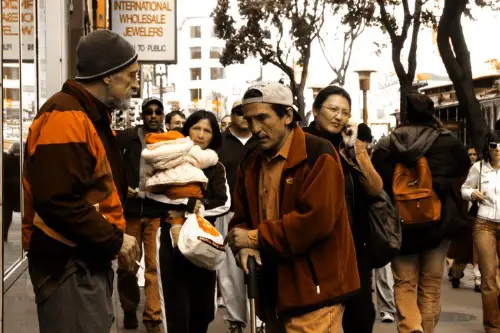
Americans often say “sorry” even when they’re not at fault. It’s less about guilt and more about smoothing over the situation. Staying silent after a bump can come across as hostile. Saying sorry, even unnecessarily, avoids that tension.
This tradition persists because it prevents micro-conflicts in crowded spaces. People default to politeness rather than risk a scene. The apology is really a social lubricant, not an admission of blame. It’s easier to apologize than to explain why you didn’t.
This post 12 Traditions Americans Keep Alive Just to Avoid Awkward Conversations was first published on American Charm.


